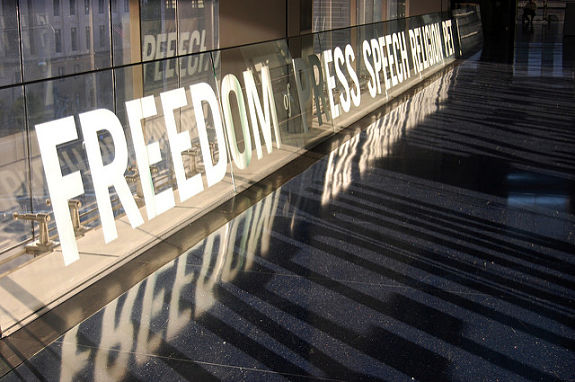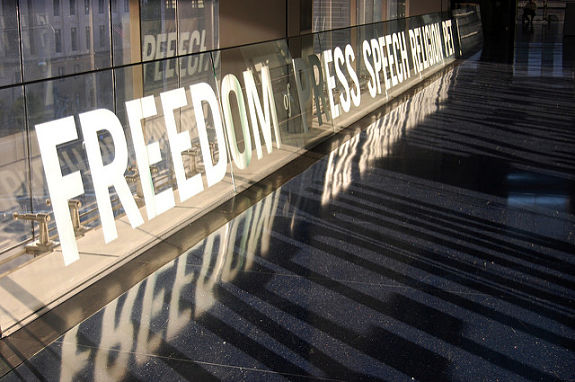Before You Go Spouting Off About Free Speech, A Primer on the First Amendment
- by
- May 02, 2017
- News
- Reviewed by: Matt Riley


Gather ‘round folks, we’re about to learn a little free speech law. Very little.
UC Berkeley is having a tough time with student groups inviting speakers a majority of their students dislike. These incidents have provoked a lot of hot takes about free speech and the First Amendment. So before you wage into your latest anonymous flame war on Twitter, Reddit, or Pinterest about this, let’s have a look at the law.
1. Let’s start with the text
Alright, so it’s always a good idea to start with the actual text of the First Amendment. Here it is, and what you will see WILL SHOCK YOU:
Congress shall make no law respecting an establishment of religion, or prohibiting the free exercise thereof; or abridging the freedom of speech, or of the press; or the right of the people peaceably to assemble, and to petition the Government for a redress of grievances.
GASP! If you have a minimally competent level of reading comprehension, you might be shocked to see that the First Amendment applies only to Congress! And you would have been right at some point before 1925. But through the magic of judge-made law—which is neither rare nor scandalous in the U.S.—the First Amendment applies to the states.
In legalese, the First Amendment applies to the states because it was “incorporated” through the Due Process Clause of the Fourteenth Amendment. From a more realist point of view, the Supreme Court didn’t think it was a good idea that the state you live in could abuse your freedoms of speech, religion, and press. So thanks to the Supreme Court, none of the states can act like budding dictatorships.
This also means state-funded schools, a.k.a. “public schools,” can’t act like dictators either, because, as arms of the state, the First Amendment applies to them. This is also judge-made law, but it took about 45 more years for this rule to emerge since the First Amendment was first applied to the states.
All this also means that the First Amendment does not apply to private schools, at least as of now—don’t private schools take tons of public dollars? It also doesn’t apply to your parents telling you to shut up and go to your room.
2. Exceptions to protected speech
You might be surprised to learn that there are several exceptions to your freedom of speech.
For example, a lot of porn used to fall under the “obscenity exception.” Supreme Court Justices would actually have to watch porn together fairly regularly to apply this little gem. Some of them were so old and hard of seeing that they couldn’t make out what was happening on screen, and would had to have the porn essentially narrated to them. Yikes.
The more relevant exception to the UC Berkley controversies is the purported exception against “offensive speech.” As of now, there is no such thing. You can go back and torture some old Supreme Court decisions to get something like a rule against intentional infliction of severe emotional distress against a private individual, but as of now, there is no such thing as an exception for offensive speech. The practical considerations here include the difficulty of deciding what counts as offensive speech in a way that isn’t overly broad, self-serving, or relativistic.
Our law generally looks at emotional distress as a suspect type of harm. The actual exceptions to free speech based on harms involve threats of physical violence.
So there is no “hate speech” exception to the First Amendment.
But, the law isn’t completely blind to the practical considerations of folks burning down a campus because they got their feelings hurt either. There are some cases that suggest that free speech can be limited if it will cause a big enough disruption. In this vein, the courts have looked at students wearing arm bands to protest the Vietnam War, t-shirts that claimed bong hits were “4 Jesus,” and cancer awareness shirts that espoused a love for “Boobies.” However, it’s unclear how today’s Court would decide something like the UC Berkeley controversies under this line of cases, since the facts are very different to state the obvious.
If you want to nerd out hard on First Amendment law, I recommend you check out Professor Eugene Volokh’s blog posts and speeches. You don’t have to agree with him, but his work is a great starting point for further research.
Search the Blog

Free LSAT Practice Account
Sign up for a free Blueprint LSAT account and get access to a free trial of the Self-Paced Course and a free practice LSAT with a detailed score report, mind-blowing analytics, and explanatory videos.
Learn More
Popular Posts
-
logic games Game Over: LSAC Says Farewell to Logic Games
-
General LSAT Advice How to Get a 180 on the LSAT
-
Entertainment Revisiting Elle's LSAT Journey from Legally Blonde








